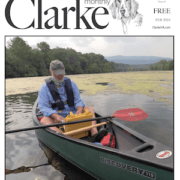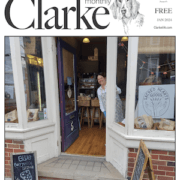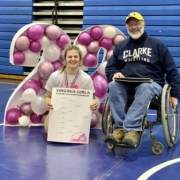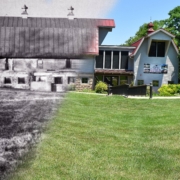Clarke County Producer Has A TV Comedy
By David Lillard
Some of the most memorable television comedies are rooted in workplace antics. In shows like The Office and Parks and Recreation, the mundane becomes surreal; the quirky becomes absurd. Enter TEETH, a new WebTV sit-com created by Berryville’s Ben Hartland. It features a zany cast of characters played by local actors that inhabit the world of a dentist office. Many of the show’s stories emerge from two local dental offices where Hartland works as a nurse anesthetist. Others come from the cast who are amateur actors, but real-life dental professionals.
TEETH centers around a suburban-raised nurse anesthetist who moves his family to his in-laws’ farm and finds employment at a wacky dental office. He must find a balance between his ineptitude at farm life and a dental office with eccentric patients and quirky staff. Anesthesia isn’t the only element draws from his own life: He and his wife and kids do, indeed, live on the family farm just
outside Berryville.
They grew from the entertaining stories Hartland would tell friends, stories accumulated from the office. Finally one friend suggested he turn the fodder into a show. Having never written a TV show — or watched a lot of it — he thought, why not? So he wrote an episode. “My friend suggested I write a pilot,” Hartland said. “And I said, what’s a pilot?” Yes, he was new
to television.
If it sounds a bit like learning to sail while building a boat, that’s just the beginning. The making of the show could one day be a show in itself.
To Hartland’s delight, the pilot got some notice. TEETH one of three winners in 2023 Scriptapalooza TV Contest, earned a top 10 percent ranking on Coverfly, and reached the semifinals of ScreenCraft
Comedy Competition.
Still, he says, only half joking, “Writing was the easy part.” After he wrote six full episodes, friends suggested filming them. Once again, having never produced a show before, Hartland thought, “Why not?”
Production meetings started in January, and by May they were ready to go. They would shoot two episodes. Everyone was volunteering their time: actors, editor/cinematographers, producers, and even, eventually, Broadway and national touring actor Michael McCoy. All of them were fitting this in around day jobs as dentists, nurses, and
dental assistants.
“We learned a lot,” Hartland says. They started editing — not final editing, just rough cuts to turn over to a pro. “I realized it was too much,” he said. Too much that wasn’t what he wanted it to be.
Despite the great excitement and dedication, Hartland and his creative got an answer to the “why not” question. Because you do the pilot first! That’s how you figure out the characters, the holes in the story line, the production issues. It’s what business developers call proof of concept.
So he made a tough decision. “Let’s stop and re-do. Let’s combine Episode One and Two into a new pilot.”
He also learned about the amount of time it takes to write, direct, act, cast, and then edit. “I have a two kids and a farm!” he said, without mentioning a day job.
Twenty actors were involved in filming the new pilot. Now that it’s in the can, it’s in post-production (editing, styling, adding the music, etc.), with a launch planned for October.
You can be one of the first to watch the pilot, plus you can meet all the actors and crew, by visiting www.teethtvshow.com. Read about the people. Sign up for email notifications. Consider pitching in a few bucks to support a local
creative enterprise.
Clarke County’s Kaylee Anderson Named Most Outstanding Wrestler at State Tournament
Story by Rebecca Maynard
Photo by Tricia Nalls
Clarke County High School senior Kaylee Anderson made the whole community proud on January 29 when she earned the Most Outstanding Wrestler award at the Virginia Girls’ Championship state wrestling tournament.
“I’ve never gotten one of those types of awards before, so it was pretty cool, and shocking,” Anderson said.
Anderson won the girls’ invitational in the 146 pound weight class. She won her first two matches on Saturday with first period pins. Leading by just one point while competing in neutral, Anderson scored a takedown with 18 seconds left and added two near fall points to win 6-1 over J.R. Tucker’s Victoria Harris.
Saturday’s tournament featured 11 weight classes and 13 divisions with girls from 58 high schools in Virginia. (The 100 and 127 classes had two divisions.) Anderson was the only girl from the five local high schools who competed.
The daughter of Tricia and Anthony Nalls, Anderson has been wrestling since 6th grade. “My cousin [Lexi Nalls] was on Team Virginia, and I’d heard about her doing big things in wrestling,” Anderson said. “At the time I was playing softball, but I was horrible at it and needed a new sport! I thought maybe I could try what she was doing.”
Anderson went to a wrestling practice at the middle school and the rest is history. She explained that currently, there is no sanctioned girls-only division in the Virginia High School League (VHSL). Girls wrestle male athletes during high school meets.
“Girls’ wrestling is growing really fast and we’re trying to get it sanctioned,” she said. “There are not many girls’ tournaments in this area, and I’m on Team Virginia, so I know when the tournaments are, but it’s harder for other girls who don’t have those people to talk to and figure out where the girls’ tournaments are.”
“Coach [Jon] VanSice has helped me a whole lot, getting me into tournaments, and his son Kyle VanSice has helped me a whole lot too, sticking up for me, and helping me with my confidence,” she said.
Outside of wrestling, Anderson said a memorable teacher for her is Mary Roberts. “She helped me whole lot, especially when we went virtual, with remembering to stay on task and get everything done and turned in,” she said.
Anderson plans to attend Shenandoah University in Winchester, where she hopes to study exercise science and/or nutrition, with the goal of becoming a personal trainer. She is close with Tim McGuire, Shenandoah’s wrestling coach, who helped train her for World Team Trials in Texas and flew out on his own dime to help coach her. She has been talking with him about trying to start a women’s wrestling team at Shenandoah.
“He said, ‘We’ll try to help you,’ so that’s my plan,” she said. “We’re going to have to start off as a club first, and build the program, but I’ll still be able to wrestle in women’s college tournaments and he’s going to recruit me to the men’s team.”
While she looks forward to a new chapter at Shenandoah, she currently has the goal to once again make it to boys’ state this year, after becoming the first girl from Clarke County to do so.
“I was really proud of myself when I made it to boys’ state as a freshman,” Anderson said. “It showed me that I was capable of doing anything.”
Main Street Chamber Orchestra Presents The Nutcracker
originally published in our September edition
By Claire Stuart
All human societies have some sort of music, and Jonathan Goldberg believes that timeless music resounds with human nature.
Although some people consider classical music a relic of the past, Goldberg vehemently disagrees. He counters that they are simply not familiar with it. With that in mind, Goldberg founded the Main Street Chamber Orchestra to make classical music a relevant part of life for everyone in the community.
Retired from a lifetime in music, primarily as a conductor in performances from New York City to El Paso, Texas, Goldberg has worked with Leonard Bernstein (“and I’ve got the pictures to prove it,” he laughed) and William Shuman, president of Lincoln Center. Goldberg and his wife Felicia moved to Berryville from Ashburn to help their daughter, Helena, who operates the Goldberg School of Music in Berryville.
Not content with retirement, Goldberg serves as Adjutant Professor of Music at Northern Virginia Community College, Loudoun Campus, and for three years he was conductor of the Rose Hill Chamber Orchestra. He tells of playing excerpts from famous pieces by Bach, Handel, Vivaldi, and others to a music appreciation class, asking whether students were familiar with at least one. All of the students answered in the affirmative, proving that classical music is alive, whether we realize it or not.
Traditionally, chamber music is defined as classical music that could be played by a small group of musicians in a palace chamber or large room. Goldberg explained that many pieces of great music are never played because symphony orchestras are too big for colleges and universities, and there are no small orchestras available for those venues. He noted that there are no professional orchestras in Northern Virginia west of Fairfax.
Confident that the community wants and will support a chamber orchestra in the region, Goldberg debated starting one himself. “I talked to many people, and they said YES! I talked to Nela Niemann (of Blue Ridge Dance Studio), and asked her if I was crazy to try this. She said I was, but that she was told the same thing and has been here 30 years!”
That settled, the Main Street Chamber Orchestra still needed a home. Goldberg spoke to Justin Ivatts, Rector of Grace Episcopal Church and Wendy Oesterling, the church’s Music Director, and the orchestra will be playing in the church hall.
Then came the big question of funding. Fortunately, the orchestra obtained grants from the Marion Park Lewis Foundation, the Virginia Commission for the Arts and the Bank of Clarke County Foundation. In addition, they had a successful Go Fund Me campaign. “Now we can already pay for the first concert,” Goldberg reported.
Goldberg explained that the orchestra is not an amateur or volunteer group although community groups may participate in performances. He stressed that the orchestra’s musicians are all paid professionals. Musicians (and the arts in general) have disproportionately taken a financial hit with the Covid pandemic. Performances have been cancelled and many musicians were forced to find other work. Ticket sales never meet the needs of musicians, hence the need for fundraising.
Performers will vary with the needs of the pieces to be played, and they come from a pool of area musicians. “Our number one horn player plays in the Baltimore Symphony,” Goldberg noted, “and we’re blessed in this region with military bands. The musicians want to play stuff they don’t get to play often. This is a pool to grow with, but with the military, scheduling can be a problem.”
The next big fund-raising event will be October 3 at The Mill at Carter Hall, featuring world-renowned pianist Brian Ganz in a benefit for the 2022 spring concert. “It’s a big coup to get someone of his stature,” Goldberg declared. “Brian has many friends in the area, and there isn’t much room, so this concert will be by invitation only. But if someone really wants a ticket, I may be able to get one if they contact me.
”Three members of the community will be playing with Ganz: Akemi Takayama, Vasily Popov and Donovan Stokes. Takayama and Stokes are both Professors of Music at Shenandoah University.
The orchestra will present a free family concert each year, designed to appeal to young people, starting with their first concert on December 11. They will perform the perennial favorite, Tchaikovsky’s The Nutcracker, and showcase dancers from Nela Niemann’s Blue Ridge Studio for the Performing Arts. The performance will take place at 3pm at Grace Episcopal Church in Berryville.
Next year’s free concert will be Handel’s Messiah, featuring Wendy Oesterling’s Piedmont Singers, in addition to singers from local churches. Planned for next spring is a performance of Leos Janacek’s “Nursery Rhymes” (not children’s music) with help from Ms. Kristi Snarsky’s Clarke County High School Choir.
Says Jon Goldberg, “The transformative power of classical music to enrich our lives can illuminate our shared humanity, reminding us that, in the words expressed in Beethoven’s Ninth Symphony, ‘All men are brothers.’”
Visit the website for information on upcoming performances: www.mainstreetchamberorchestra.org.
Burwell-Morgan Mill History Still Being Made
For one Clarke County woman, the mill is part of her story. And she’s not alone.
Based on Kathy Hudson’s writing, with support from David Lillard
Back in 1985, Kathy Hudson had a decision to make. A recently minted college graduate with a degree in education, she had interviewed with — and would subsequently receive offers from — Clarke County Public Schools and Charles County, Md.
By Kathy’s telling, the Burwell-Morgan Mill in the village of Millwood, helped tip her decision to move to Clarke.
Now retired, she coordinates volunteers at the Art at the Mill event, sponsored by the Clarke County Historical Association and scheduled October 2 through 17.
“When I came to Clarke to interview, I first met Assistant Superintendent William Overbey in the administration offices,” recalls Kathy. “After our interview, John McCuan (my future principal at Boyce Elementary School) picked me up in his Subaru to take me to see Boyce School.” After the interview, on the drive back to Berryville, McCuan took Kathy on a short scenic drive of Clarke County through Boyce to Millwood. “As we passed some of the grand houses on that road, I was charmed,” she said. “Coming from the suburbs of Pittsburgh, I had seen my share of old neighborhoods and estates (albeit with not much property tacked on,) so it was nothing unusual. When we got to Millwood, however, I knew I was hooked on Clarke County.”
It was on that trip that McCuan pointed out the Burwell-Morgan Mill.
“I took one look, and I was enchanted,” said Kathy. “I love history; knowing that roots in the county went back to the 1700s made Clarke County my choice to come and work.”
Kathy married in 1987 — “a native Clarke County boy,” as she says — raised two sons, and retained her love of the region’s history and landscape. Shortly before she retired from Boyce Elementary School in 2015, her good friend Kathy Campbell, who was then Clarke County Historical Association’s president, called for a favor. She asked if Kathy would coordinate the volunteers for the upcoming art show at the Mill.
“I begged off, since I was still working,” said Kathy. “And, truthfully, I did not think I would be able to do a very good job with it. I told her to get back in touch with me after I retired.”
Campbell didn’t let Kathy forget that promise. In the fall of 2017, Kathy started making phone calls for volunteers. She also volunteered at the art show; and this opened a new world for her. “I really enjoyed meeting the artists, seeing their artwork, and meeting the public and patrons who came to the show,” said Kathy. “I’ve been involved with the art show ever since.”
In 2019, she joined the historical association’s board of of directors. “Since I have been retired, I have termed this the decade of giving back,” says Kathy. She also served on the board of The Barns of Rose Hill, from 2015–2020, and the Clarke County Education Foundation since 2019. “When I was working full time for CCPS, I did not feel I could take on additional roles in the community,” she said. “One of the things that I took to heart from my service on the Barns of Rose Hill board was to ‘give of your time, talent, and treasure.’ As a retired school librarian, I may not have much ‘treasure,’ but I certainly have the time and skills to help our community, and I am thrilled to be involved with the CCHA.”
Kathy is especially gratified to know that the efforts of past committees and the current Art Show Committee (Kathy Campbell, Gwen Casey-Higgins, Snow Fielding, Candy Means and Janet Bechamps) and a myriad number of volunteers help keep the historic mill going — millers, junior millers, others who volunteer for a few hours during the show. “Never in my wildest dreams in 1985 did I envision becoming involved with this beautiful, restored building,” said Kathy.
The art show is the largest fundraiser for the Clarke County Historical Association; it helps keep the water wheel in the Burwell-Morgan Mill turning. “Thanks to the purchase of the mill by the CCHA in 1964, its leaders over the years, and efforts of the Art Show Committee, started by Sally Trumbower in 1990, the Burwell-Morgan Mill continues to thrive,” Kathy added.
Art at the Mill includes artists from the mid Atlantic region, featuring varying styles and prices.
The show runs from October 2–17, from 10am till 5pm 10-5 on Saturdays and noon till 5pm Sunday through Friday.
You can preview artwork at https://artatthemillfall2021.artcall.org, then navigate to the web gallery. You must call the Burwell- Morgan Mill at 540-837-1799 during art show hours to purchase.
Become a CCHA member on when you visit and enjoy free admission; admission for non-member adults is $5 and $3 for seniors. Students can attend for free.
CDC guidelines will be observed, and there will be no Patron’s Night.
The Barns of Rose Hill: Celebrating a Milestone Anniversary and Decades of Support
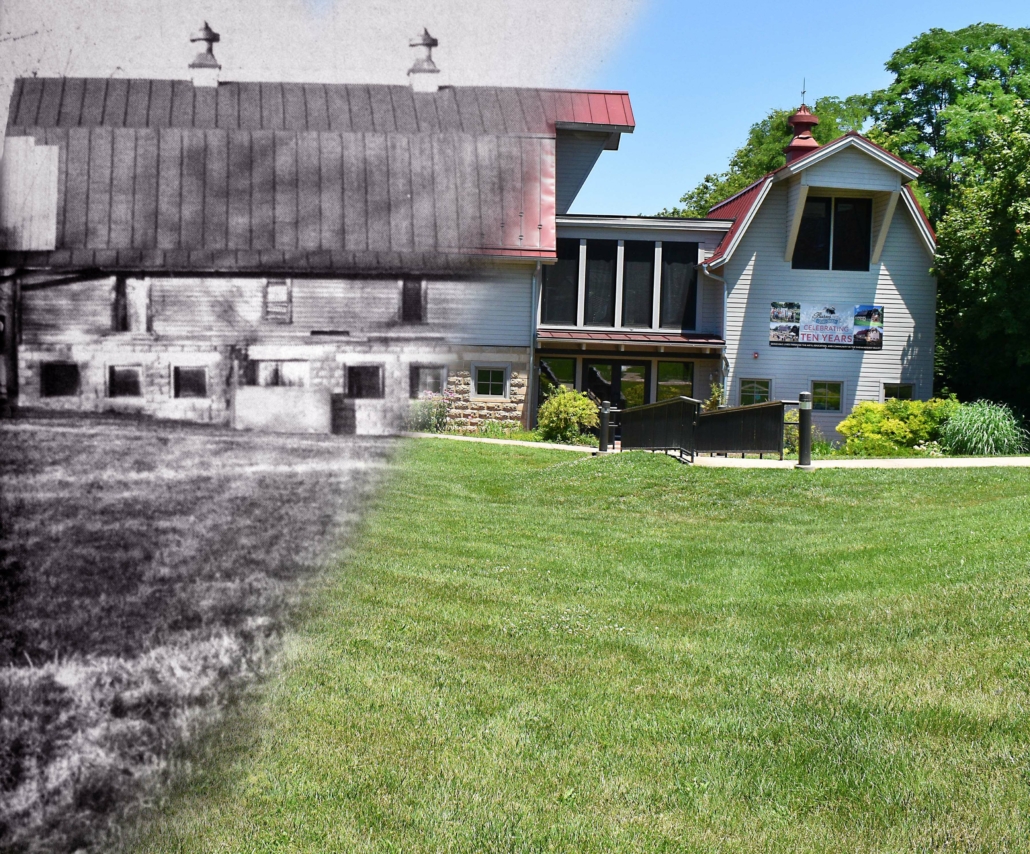
By Cathy Kuehner
Hundreds of people have played significant roles over the decades, working to build a contemporary cultural arts and community center out of two old dairy barns in downtown Berryville. They gave creativity, time, money and — quite literally — blood, sweat, and tears to build the Barns of Rose Hill.
“Given the small size of our community, it’s kind of amazing that the Barns happened at all,” said Michael Hobert, a longtime supporter of the Barns and a member of its Board for the past six years. Hobert, who grew up in Berryville, remembers the Smithy property known as Rose Hill, its development into Rose Hill Park, and the old barns there.“When I was growing up, we went to the community building for events,” he said, referring to the American Legion building that is now used by Dollar General on Church Street. After the town was given the Smithy property in the 1960s, Hobert said there were “a lot of false starts as people tried to do something with it.”He always believed the circa-1910 barns last occupied by livestock in the 1950s could be “a center where people come together to enjoy music and art.”
Hobert said the Barns of Rose Hill became a reality 10 years ago thanks to visionaries like Diana Kincannon.In 2004, Kincannon was asked to help with the barns community center project. The first thing she did was seek counsel to establish it as a 501(c)(3) nonprofit organization to provide for a Board of Directors, a clear mission and vision, and the ability to apply for much-needed grants.With Barns of Rose Hill, Inc., established, the board focused on a $2 million fundraising campaign.
“We developed a clear vision for the barns,” said Kincannon, who served as the board’s first president. “We articulated the intangible benefits to the community: the power of the arts and creativity to bring people together, to enrich our lives, and to enrich the whole community.”Those associated with the project were known as “Barns Raisers,” and they kept on that message for six years. “We pursued every avenue we could,” Kincannon said.Gifts came in all sizes — $5 to $100,000 — as did grant money. The Town of Berryville and Clarke County governments contributed, too, so the Barns of Rose Hill could also serve as a tourism center.“
When the Barns finally opened in September 2011, it was exactly what we envisioned,” Kincannon said. “There was classical music, bluegrass, jazz, theater, and so much visual art. Ten years later, the Barns continues to fulfill our vision, and it has exceeded my expectations.”
Like Hobert, Susi Bailey was born and raised in Clarke County, and over the years she has owned a business along Berryville’s Main Street and served in many civic organizations, including Downtown Berryville Inc. “This is my community, and the Barns project was a community effort, so of course I helped.”
In a predominantly agricultural area, one hurdle was explaining the need for a cultural center. “Do we need art and music?” The question was often asked, Bailey said, but the movement to preserve the historic barns and create a place for art and music grew and grew.“
When we broke ground for the Barns in 2010, I felt like I had been pregnant for 10 years and had finally given birth,” Bailey said, laughing.
After opening, the board served as management until it could find money for a small staff, and it took the Barns a while to find its audience and attract the recognized artists and musicians it does today.
“We’ve been pretty stable since 2014,” Bailey said, adding, “We have a good 13-member board, good staff, and every year more people come for
the shows.”
In 2019 almost 10,000 people passed through the Barns’ doors, Kincannon said, noting visitors were coming from Northern Virginia, the Shenandoah Valley, and West Virginia’s Eastern Panhandle. “Momentum was building for a better year in 2020.”
Then came the coronavirus. Businesses everywhere — especially performance venues — were hit hard financially by the global pandemic.
Sarah Ames, who began as the Barns’ office manager in 2017, was named executive director in January 2020, just as the world was beginning to hear about COVID-19. “Our 2020 schedule was fully booked with about 40 concerts, 30 community events, and weekly programs like music jams and art classes. Then, we had to shut down for months.”
Its small staff — Ames, program director Morgan Morrison, director of operations Nathan Borger, and part-time office manager Tiwana Brooks — had to be more creative than usual and adapt to broadcasting concerts and classes on YouTube and Facebook.
“In a good year, 30 percent of our income is ticket sales,” Ames said. Fortunately, enough folks paid for online offerings or made donations to help the Barns get through 2020. Ten years on, the community sees the value of the Barns.
Morrison joined the Barns small staff in 2012. She had performed there before with Furnace Mountain, and she continues to perform there with the band and at the bi-weekly Thursday night old-time music jams.
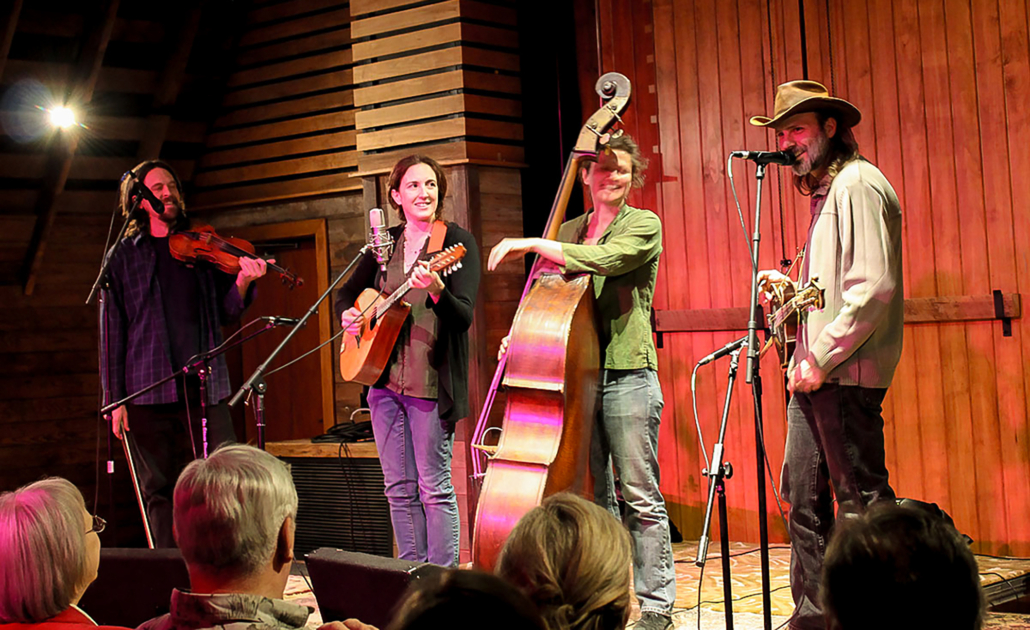
“As a musician, I enjoy bringing people together for a common experience,” she said.
Morrison says programming continues to evolve as staff determines what the community wants and as performers learn of the Barns’ intimate performance space with outstanding acoustics. “We want to introduce audiences to new experiences, and that needs to be balanced with the familiar,” she said.
A thriving cultural arts center in an agricultural area is a significant accomplishment, Ames added. “It’s a great place for people to come together — and we especially need that in this post-pandemic time.”
Bailey believes more and more people recognize the Barns as a community resource.“The Barns attract people from all over Clarke County and even farther away,” Hobert said. “I hope the Barns continue to grow and engage more people.”
“I see the Barns of Rose Hill as a promise fulfilled to the Smithy family,” Ames said. “It was important to the family that their property benefit everyone, and the Barns do that.”Said Bailey, “I still get chills when I’m standing in the Barns at a sold-out show and think about how far we’ve come.”
A Brief History
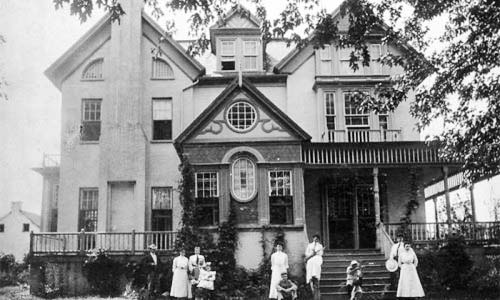
It may be difficult for some to imagine a farm with a grand home in the center of Berryville. Those who lived in Clarke County in the 1960s and ’70s may remember the property being gifted to the town, its gradual development into a park, and the spring day in 1978 when an arsonist destroyed the mansion before plans to create a community center could be realized.
Fortunately, the circa 1910 barns on the property were unscathed by the fire. Today, they are the much loved Barns of Rose Hill — a community, tourism, and arts center that has hosted countless exhibits, concerts, movies, and educational programs since opening in September 2011.
But the transformation from livestock barns last used in the 1950s to a contemporary cultural center took decades, and would not have happened at all without a community of dedicated and passionate volunteers.
Originally a 100-acre estate, Rose Hill was built in the mid-19th century by S.S. Neill, a surgeon for the Confederate Army. Following the war, the property was sold to Marshall McCormick, a lawyer who later served as Berryville mayor, Clarke County Commonwealth’s Attorney, and Virginia senator. McCormick owned other large farms in the county, too, including adjoining Clermont as well as Annfield and Norwood.
McCormick’s daughter Rosalie married Horace Gilbert Smithy in 1911, and soon after, Smithy purchased Rose Hill from his father-in-law.
Rosalie died in 1963 and, in 1964, Smithy donated their Rose Hill estate to the town. By then it was only a few acres, the mansion, the barns, and a small house. To honor his wife’s interests, Horace stipulated that the Rose Hill property be used for “the educational, recreational, and cultural benefit of the community.” For a while the mansion was used sporadically for community events.
By 1968, it was the Clarke County School Board leading discussions about converting Smithy mansion into an educational and cultural center, including a library and space for teenagers to hang out. The Board obtained grants, plans were made, but time and again the project stalled. The fire in 1978 put an apparent end to the proposed “Clarke County Community Center.”
Meanwhile, the Town of Berryville developed Rose Hill Park, adding its iconic gazebo in 1985. In 1989, the Berryville-Clarke County Chamber of Commerce was given permission to renovate the barns for its offices, a tourism center, and art gallery.
Turns out, renovating two barns that sat unused for almost four decades was not easy or inexpensive.
By 2001, Rose Hill Park was well established, and the Town of Berryville and Clarke County together purchased 3.56 acres of vacant land next to it to enlarge the park and create additional access to the barns. The land also provided space for the Berryville-Clarke County Government Center that opened in December 2008.
The same year, Downtown Berryville Inc. (a Virginia Main Street program) began organizing fundraising events to support the restoration of the barns.
It took years.
A nonprofit organization — Barns of Rose Hill, Inc. — was officially formed in September 2004, and it launched a capital campaign to continue the
fundraising efforts.
Community members and donors were affectionately called “Barns Raisers,” and the Berryville-based architectural firm of Carter+Burton was hired to design the building.
Carter+Burton sensitively preserved a lot of the early-20th century barns’ original character and structure — including much of its wood, red standing-seam metal roof, and venting cupolas — while creating a beautiful, functional 21st century facility.
Construction began in 2010 after more than $2 million in public and private funds had been raised, and the project was completed in late summer 2011.“Saving the barns mattered to a lot of people,” said Diana Kincannon, who helped form the nonprofit organization in 2004 and served as the first president of its board of directors. “We knew we had these wonderful old barns, and this was our last chance to save them.”
The Barns of Rose Hill exist today because enough people cared to give as little as $5 or as much as $100,000 so the community may enjoy the fine and performing arts well into the next century.
Be Part of the 10 Year Celebration
To mark its 10th anniversary, the Barns of Rose Hill is hosting a free event for the community on July 31, an historical exhibition throughout October, and a gala event on Oct. 16. Follow “Barns of Rose Hill” on Facebook or go to barnsofrosehill.org for details, updates, and additional events.
10-Year Celebration on Saturday, July 31
The Barns of Rose Hill invites everyone to meet in Berryville’s Rose Hill Park at 5 p.m. Saturday, July 31, for a free outdoor concert, kid-friendly activities, and a petting zoo. Hog-it-Up BBQ and Generations Gourmet food trucks will be on site. At 7 p.m., Grammy nominee Cheick Hamala Diabaté and his band present a free concert of West African music that will have everyone on their feet and dancing.
Interactive Exhibit in October
The Barns staff has been busy this year gathering archival photos, newspaper articles, and memorabilia that tell the story of how two old dairy barns were transformed into a contemporary cultural arts and community center. People new to the area, people who love history, and everyone who appreciates the Barns of Rose Hill will be fascinated by this month-long exhibit.
Fundraising Gala on Saturday, Oct. 16
The global coronavirus pandemic disrupted just about everything for everyone. Non-profit organizations like the Barns of Rose Hill did all they could to keep the lights on and continue presenting art and music in some form. The Barns held an online fundraising event in 2020, but staff is planning an in-person gala later this fall.
Buy an Anniversary Brick!
The traditional 10-year anniversary gift is tin or aluminum, but perhaps you’ll consider an engraved brick for the patio leading into the Barns. This year, the Barns is offering a special 8-by-8-inch commemorative brick for $250. These bricks can be inscribed with three lines of text; each line up to 18 characters including spaces and punctuation. A standard-sized 8-by-4-inch brick is available for $100. It can accommodate up to three lines of text; each with 21 characters including spaces and punctuation. Contact the Barns at (540) 955-2004 or info@borh.org., or go
to barnsofrosehill.org.
The Barns of Rose Hill is located at 95 Chalmers Ct. in Berryville. Hours are noon to 3pm Tuesday through Saturday for exhibits, tours, and the tourism center and at other times for performances, events, and classes.
Contact the Barns at (540) 955-2004 or info@borh.org.
Follow “Barns of Rose Hill” on Facebook. Find more information at barnsofrosehill.org.



